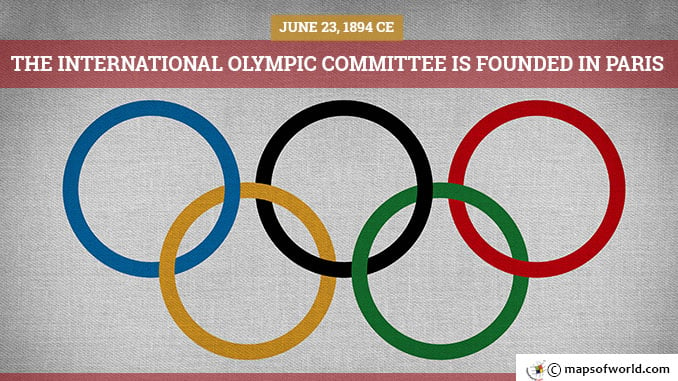Pierre de Coubertin, a French historian and sports enthusiast, finally realized a five-year dream on June 23, 1894: a new organization would be formed to encourage athletic competition between nations. The International Olympic Committee, led by its Greek president, Demetrios Vikelas, would soon pull together its first event and revive an ancient tradition – one that continues to bring the world together every four years to this day. Though an English physician, David Brookes, created an Olympic Games on the British Isles in 1866 as a means to encourage people to exercise, Coubertin is credited with getting the ball moving for the spectacle we now recognize as the premier international competition for many sports. After founding the Comité pour la Propagation des Exercises Physiques in 1888, the Frenchman began pondering a means to bring athletes together the following year. Lacking in ideas and influence, Coubertin placed an ad in the newspaper in 1890. Across the English Channel, Dr. Brookes read the plea for help and instantly wrote to his fellow health fanatic. The two conversed about the benefits of both education and exercise (Coubertin was an expert in the former), with Brookes eventually hosting a dinner to honor Coubertin in England. Though unable to attend the first meeting of the IOC in 1894, Brookes brought his connections with the Greek government to bear. Coubertin did not waste the chance, soon working with cousins Evangelis and Konstantinos Zappas to secure funding for the remodeling of Panathinaiko Stadium. When the convention started, the delegates were immediately divided into two subcommittees: one to plan the first competition (a responsibility that fell largely on Greek officials) and a second to define amateurism. Coubertin, ever the idealist, swelled with pride. His wish to avoid the inclusion of professionals – which he believed excluded working-class athletes – and the ancient tradition of declaring peace while sporting events were underway served as his continued inspiration in the pursuit of such a grand event. Writing later, he outlined his thoughts on the Olympic mission like this: The important thing in life is not the triumph but the struggle, the essential thing is not to have conquered but to have fought well. Despite a range of conflicts between the IOC and Greek organizers, the 1896 Summer Olympics were immensely popular. Coubertin would end up disappointed with the sports featured – polo and boxing were left out, soccer was canceled due to a lack of teams – and his icy relationship with officials from the host country, yet generally satisfied with how his idea had come to life. In the century-plus that has followed, the Olympic movement has suffered through its ups and downs. The Games in 1900 (chaired by Coubertin) and 1904 were both disappeared into the shadow of World’s Fairs occupying the same portion of the calendar. Attendance would again swell after each of the World Wars, with the Summer Games soon regarded as the centerpiece of world sport. With 105 active and 32 honorary members, it could be considered the most influential sporting organization on the planet today.
June 23, 1894 CE – The International Olympic Committee is Founded in Paris
Pierre de Coubertin, a French historian and sports enthusiast, finally realized a five-year dream on June 23, 1894: a new organization would be formed to encourage athletic competition between nations.…
399
